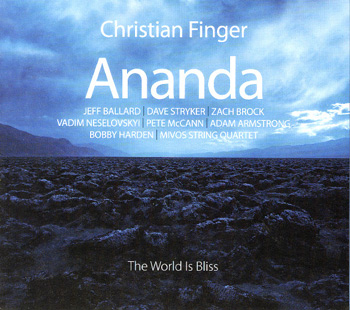 by: Hobert Taylor
by: Hobert Taylor
Christian Finger - Ananda - (Strikezone Records)
Some tunes have purity and clarity. They seem to link to the old stories told by elders so long ago that they are a part of the genetic code. Sometimes the melodies seem to be folk tunes from multiple cultures murmuring narratives, cautionary tales, celebrations, nostalgic musings. Sometimes the music has the lilt of jazz, syncopation, ellipsis and substitution, a familiar cadence that says you've heard this before, but not quite like this. Sometimes the stories are structured, logical, traditional, reliable in their conclusions and resolutions... quote classical unquote.
Drummer composer Finger and his compadres, Vadim Neselovskyi pianist, Pete McCann and Dave Stryker, guitars, bassist Adam Armstrong, violinist Zach Brock, and the wondrous Mivos String Quartet combine all the elements mentioned before to make a human music... not world, not crossover, not even exactly third stream (jazz classical cross pollination), but human music that passes through the ear bypassing the the pre-frontal cortex (judging-comparing) and headed straight for the hippocampus (emotions and long term memory).
I could write extensively about each tune, but this time I prefer to leave analysis to you the individual listeners, that is if you feel the need to analyze this music at all. For me it is a thing of great beauty, elegant in its simplicity, authentic in its intimacy, revelatory in its familiarity.
OK Now for the Pop Culture meets High Art report.
Kamasi Washington - The Epic - Brainfeeder Records
In the late '60's early '70's jazz met funk and rock and out came P-Funk, Frank Zappa, Don Ellis, Eddie Harris, Rahsan Roland Kirk. King Curtis (more on him and Kamasi later,) and of course Marshall Allen from Sun Ra's Arkestra and Maceo Parker. There were the major influences of the eras before that defined the context for this sub-genre of jazz, the spirituality of Coltrane, the the chain re-action of neurons firing that was Bird and later Ayler, the meditative genius that was Eric Doplhy, the freedom of thought called Roscoe Mitchell and The Art Ensemble of Chicago and Ornette Ornette Ornette, but basically the late 60's and early '70's was about taking jazz out of the clubs and putting into popular culture. This is where the honkers and shouters and seducers come in... Maceo, Gato Barbieri, Stanley Turrentine, Sonny Stitt.
The purpose of this introductory taxonomy is to suggest that Kamasi Washington is a talent on that level and that his ambitions mirror those of the powerful and clearly identifiable artists and popularizers mentioned above.
This is not to say that this is a perfect album. I find it epic,( three discs!)but not Epic... often more grandiose than grand. Let's examine it on three levels.
First as composition: The tunes fall into a number of categories, minor modal explorations, polyphony, blues changes, circles of fifths, scales and other pretty traditional forms. Counterpoint is often provided by a chorus of voices emphasizing the major harmonic changes and providing a cathedral ceiling for the often frantic improvisational virtuosity of the many extraordinary soloists who perform here.
Secondly as arrangements: There are a lot of nouveau big band sounding arrangements. There is a wink and a nod to West Coast Jazz (ironically some of the arrangement even sound Stan Kentonish), and to Woody Herman. There are many post bop homages to the Abbey Lincoln/Max Roach collaborations and to the VSOP small ensemble horn choirs There are the deep funk Black Moses rumblings of Memphis, and even a little NOLA second line with trading of fours ("Re-Run Home"). The Don Ellis-Zappa connection rests in the idiosyncratic time signatures . The uptempo tunes just plain go for it, exploding solos with hard charging melodies. The ballads can get very syrupy to my ear including a sung version of "Cherokee" that sounds like it was played as a last dance at a wedding reception long after the bride and groom have gone. There is a hilarious and lovely version of "Claire de Lune" which makes me think of the gorgeous drag queens of Houston at four in the morning haunting The House of Pies just as you start coming down from your trip. And finally there is the business of the chorus, (the Greek chorus ?) that appears periodically through out all three discs of this massive undertaking. Sometimes they underscore and accentuate deep and heartfelt emotion, sometimes they sound to me like the soundtrack to a '50's sci -fi flick. Whatever.
Finally, Washington's playing.: Damn. The man can play. He has an authorial voice, tone and expression that not only is identifiable but seizes whatever he plays, melodic line, improvisational interjection, or backing harmony in hands clutched tight and firm. He has the potential to be the next great voice, a player who has one foot in tradition and skill like the a virtuoso individualist cutting heads on the chitlin' circuit, and the other in the current zeitgeist.
So I promised that I would say something about King Curtis in this review and here's why. Curtis played with precision and unfailing instincts that shouted blues blues blues. His solos if isolated from the rest of the track would carry the full emotional weight of the tune and you could hear in your inner ear what everybody else should be playing. His solos would build in ways both inevitable and gratifyingly surprising in turns. This is what I believe Washington also brings to the table.
I wish The Epic were not quite so epic, one tight disc instead of three, shorter tunes, tighter arrangements. But Kamsi Washington is the real deal.
Share
|
|

